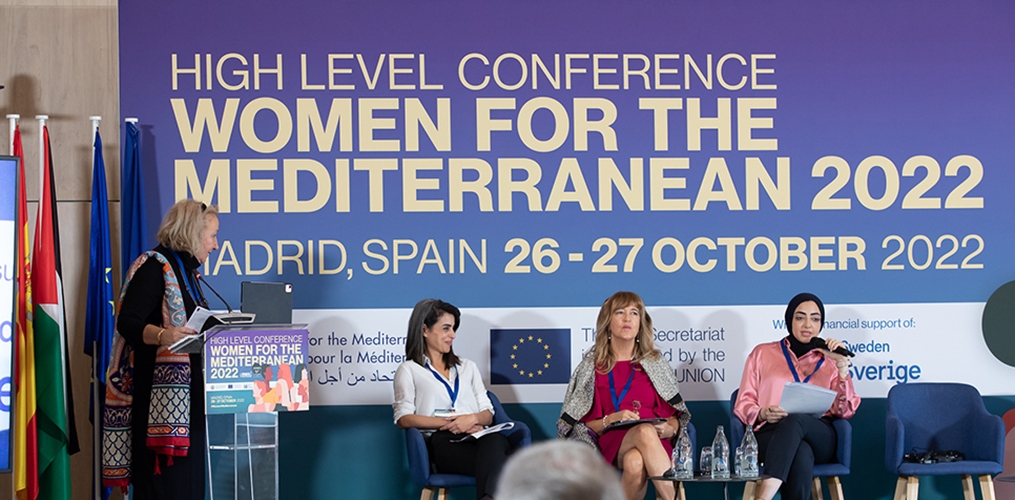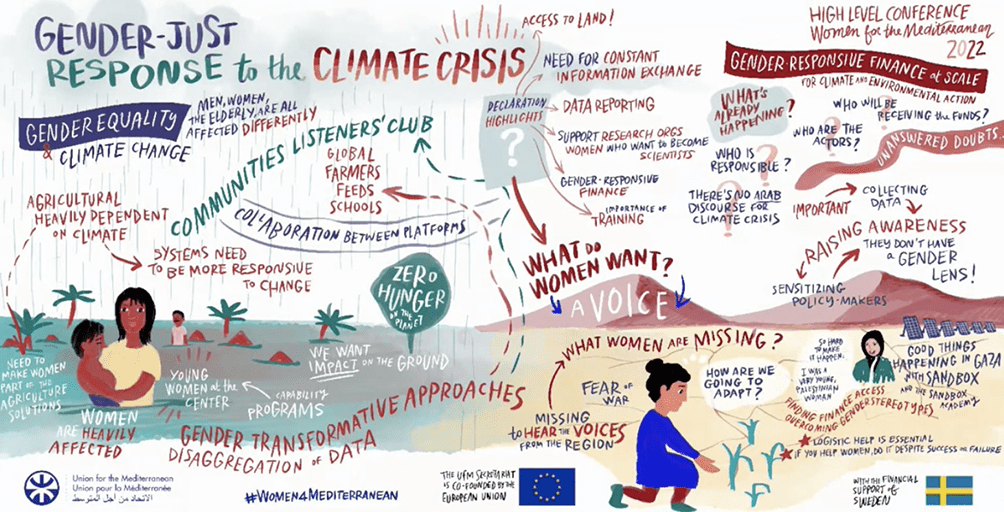
LifeWatch ERIC International Gender Officer, Africa Zanella, took part this week in the Women for the Mediterranean Conference in Madrid, where Union for the Mediterranean member states committed on Wednesday to strengthening the role of women in society in response to regional crises. Ms Zanella, who is also CEO of CGSE, as well as Observer and Gender Focal Point for the CIF, moderated the panel “Gender Equality and Climate Change: women as agents for change and stakeholders instead of vulnerable groups”, followed by participation in the panel “Gender-responsive finance at scale for climate and environment action”.
A recurring theme in her speeches throughout the day was calling for attention to language, and she opened by rejecting the ubiquitous term “climate change”, calling for the phenomenon to be referred to as the “climate crisis”. Also in common with her following presentations, she called for more gender analysis into research and policy, explaining her role within LifeWatch ERIC to implement a Gender Equity Plan, which is now a requirement for participation in EU research funding programmes, and use of tools such as IGAR to increase equality and wellbeing in the research infrastructure, which provides science research facilities and services to scientists investigating biodiversity and ecosystem functions towards addressing key societal challenges linked to climate change.
For the first panel, she introduced panellists: Saira Ahmed, Programme Management Officer at UNDRR, Blanca Moreno-Dodson, Director of the CMI, UNOPS, Yasmine Seghirate, Policy and Communication Officer at CIHEAM, and Maggie Refaat, Regional Gender Specialist at FAO. Some of the key points the experts spoke about were the desegregation of data for effective gender analysis of policy, due to the large diversity within genders, and about increased information exchange between universities and research infrastructures in order to develop equality plans and support women who want to become scientists.
Next, Africa Zanella invited the panellists to choose the point of action from the Gender Declaration which they believe would make the best change for women. Points mentioned included training and research, due to the important of having data which reveals how climate change is affecting women; monitoring changes to legislation, which largely needs to be reviewed in order to incorporate gender component; the importance of having reliable data on climate financing, to encourage the private sector to collaborate with public sector; gender transformative approaches, such as increased reporting on women’s access to land ownership and access to knowledge; and increased investment in a gender-sensitiiveresponse to disasters, which would involve more resources made directly available to grassroots women’s organisations.
When as a panellist the Gender Officer was asked how the Union for the Mediterranean roadmap could be improved, she stated the stark fact that only 0.04% of climate funding is dedicated into gender, citing the problem as a bureaucratic resistance to change globally. Moreover, in line with her previous statements, Africa Zanella called for an end to tokenism, explaining that women are not are homogenous group, and further factors must be taken into account, such as sector, region, etc.: requiring a more thorough and detailed analytic approach to developing gender-responsive policy. Finally, Ms Zanella mentioned ongoing research being undertaken by CIF World Bank, for which she is part of the reference group, which shows that what women in developing countries want is a voice, so they can give their perspective and decide their own fate.
About Union for the Mediterranean
The Union for the Mediterranean (UfM) is an intergovernmental Euro-Mediterranean organisation which brings together all countries of the European Union and 15 countries of the Southern and Eastern Mediterranean. UfM’s mission is to enhance regional cooperation, dialogue and the implementation of projects and initiatives with tangible impact on our citizens, with an emphasis on young people and women, in order to address the three strategic objectives of the region: stability, human development and integration.
